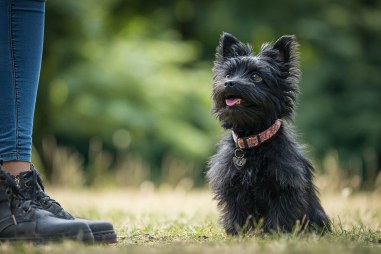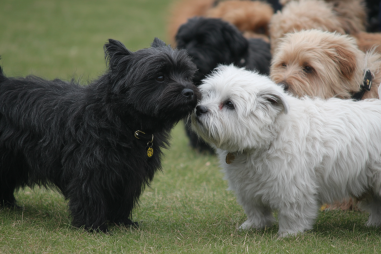Affenpinschers, with their lively personalities and charming expressions, make wonderful companions. However, like any breed, they come with their own set of behavioral quirks and challenges. For owners, understanding these common behavior problems is key to fostering a healthy, happy, and harmonious relationship with their furry friends. From their notorious stubborn streak to bouts of excessive barking or separation anxiety, knowing why these behaviors happen and how to manage them can transform daily living for both you and your Affenpinscher.
Frequent Behavior Challenges in Affenpinschers
Affenpinschers are spirited and intelligent dogs, but certain behaviors tend to crop up more often within this breed. Among the most common issues are stubbornness, excessive barking, and separation anxiety. Their bold nature sometimes means they want to do things their own way, making obedience training a bit challenging. Their alertness and protective instincts can also lead to frequent vocalizations, which may frustrate owners dealing with constant barking. Additionally, Affenpinschers can develop separation anxiety if left alone for extended periods, leading to destructive behavior or distress signals.
Causes of Stubbornness and Disobedience
The stubbornness seen in Affenpinschers often stems from their independent temperament and sharp intellect. These dogs like to problem-solve on their own terms, which means if a training method doesn’t engage their mind or disrupts their routine, they may resist following commands. Furthermore, inconsistent leadership or lack of clear boundaries can confuse an Affenpinscher, contributing to disobedience. Without firm but gentle guidance, they may test limits to see what they can get away with, which owners often interpret as stubborn behavior.
Another factor is their inherent confidence. Affenpinschers were originally bred as ratter dogs, requiring them to think independently and act decisively. While this trait is an asset in many scenarios, it can make training more complex if the dog perceives commands as unnecessary or disagreeable. Hence, patience, consistency, and positive motivation are critical to overcoming stubbornness.
Managing Excessive Barking
Barking is a natural form of communication for dogs, but with Affenpinschers, it can become overwhelming if it turns excessive. Their alertness and keen awareness of their surroundings make them inclined to bark at unfamiliar sights, sounds, or people. Barking may also escalate out of boredom, anxiety, or the need for attention.
Effective strategies for managing barking include:
- Identifying triggers: Observe when and why your Affenpinscher barks to recognize patterns.
- Training commands: Teach a “quiet” or “enough” command with rewards for calm behavior.
- Providing enrichment: Regular exercise, puzzle toys, and interactive play reduce boredom-driven barking.
- Setting a routine: Predictable feeding, walking, and playtimes help your dog feel secure.
- Avoiding reinforcement: Do not yell or give attention while your dog is barking as this may inadvertently encourage the behavior.
Dealing with Separation Anxiety
Separation anxiety occurs when a dog becomes distressed after being left alone, and Affenpinschers can be particularly prone to this due to their social and loyal nature. Signs include whining, pacing, destructive chewing, bathroom accidents, or excessive barking when their owner leaves or is absent.
To help mitigate separation anxiety:
- Gradual desensitization: Start by leaving your dog alone for very short amounts of time and gradually increase the duration.
- Create a safe space: Designate a comfortable area with toys and blankets where your dog feels secure.
- Keep departures low-key: Avoid dramatic goodbyes that may increase anxiety.
- Provide distractions: Leave interactive toys or treat puzzles to keep your dog occupied.
- Establish a routine: Consistency in daily activities can reassure your dog.
- Consider calming aids: Items like anxiety wraps or pheromone diffusers can be beneficial in some cases.
Effective Behavioral Modification Techniques
Positive reinforcement is paramount when addressing behavior problems in Affenpinschers. Rewarding good behavior encourages your dog to repeat those actions, while ignoring or redirecting unwanted behavior is often more effective than punishment. Consistency is the foundation of any successful training regimen, ensuring your dog understands what is expected.
Some behavioral modification techniques include:
- Clicker training: Using a clicker to mark desired behaviors provides clear communication.
- Counter-conditioning: Changing your dog’s emotional response to a trigger, for example, by pairing the sight of a visitor with treats to reduce barking.
- Desensitization: Gradually exposing your dog to a feared stimulus at a low level to lessen the reaction.
- Redirecting attention: When your dog displays unwanted behavior, call their attention to a preferred activity or toy.
- Regular socialization: Introducing your Affenpinscher to various environments and dogs helps reduce anxiety and unwanted reactionary behaviors.
When to Consult a Professional
While many Affenpinscher behavior problems can be managed at home with patience and consistent training, sometimes professional help is necessary. If your dog’s behavior is causing you distress, becoming dangerous, or if anxiety and stubbornness persist despite your best efforts, seeking a qualified dog trainer or animal behaviorist is a wise step.
Professionals can offer tailored training plans, insight into the underlying causes of behavior problems, and support for cases involving serious separation anxiety or aggression. In some cases, veterinarians may recommend additional therapies or medication to assist with behavioral modification when anxiety is severe.
Understanding your Affenpinscher’s unique behavioral tendencies and approaching challenges with empathy and appropriate training will nurture a fulfilling and joyful partnership. With time, patience, and the right strategies, you can help your dog become a well-behaved, confident, and content member of your family.







